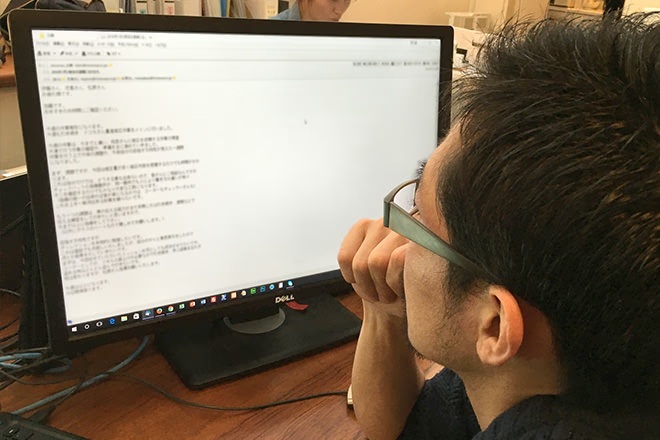This is Kato from Coding Factory.
This time, I would like to write about the writing study method that I used to improve my writing skills, thanks to the guidance I received from my department manager, team leader, and senior training officer, since when I first joined the company I could only write terrible sentences.
The start of the weekly report
I had never really used a computer until two years ago. In my previous job, I was a craftsman (plasterer), so I rarely had to communicate with others in writing, and I had no opportunity to write at all since I was a student. Moreover, writing essays was what I hated most in my student days, so I naturally avoided writing.
I think that this was the result of my poor writing skills when I first joined the company. Even now, I'm still not very good at writing, but I think I've improved a lot since then.
At Coding Factory, we hold a training committee for new employees, consisting of the department head, team leader, and senior coders in charge of training. My next assignment was decided there.
The two things I needed to do to become independent were to improve my writing skills and develop the habit of reporting, contacting, and consulting. With these goals in mind, I decided to submit a weekly report.
Coding Factory's coders act as directors and communicate directly with clients via email and phone. For first projects, a senior will provide direction, but in most cases the coder will directly coordinate with the client on production details, so good writing skills are essential.
When I first started writing the weekly report, I think my writing skills were terrible. Not only were there typos, but there were also a lot of punctuation marks... Moreover, because I didn't understand the meaning of "report, contact, and consultation," I couldn't feel that it was for my own benefit, and I wrote it hastily from a selfish perspective.
However, after writing the report for the second or third time, I suddenly realized something. I send my weekly report to the department head, leaders, and senior coders. Naturally, they have a larger scope and volume of work than me, and are incomparably busier than me, but they always give me feedback and thoughts. After I realized that, I started to write my weekly report seriously (I'm really sorry).

The manager checks the weekly report sent by email
I'm embarrassed to say it myself, but I think this experience has helped me grow. I never really paid much attention to it before, but now I check whether it's okay to use words when speaking to someone older than me, and I read my messages over and over again before sending them to make sure there are no typos. It's a simple thing, but I hadn't even been able to do that before.
The benefits of weekly reports

I think the purpose of a weekly report is to report the work done for the week to your superiors, but in fact it is a daily accumulation. Even though it is a week, it is surprisingly difficult to remember the good and bad things that happened from Monday to Friday. So I made sure to write a daily work report properly.
At the beginning of each day, I write out my work schedule from 10am to 7pm, and make a note of whether the day went according to plan, and if so, what went well, and if it went slower than planned, what didn't go well and which tasks need to be done more efficiently. I then report this in my weekly report and get advice on how to solve the problems.
Continuing to keep up with the weekly reports had a variety of effects. Since it may be different for each person, I can only write about what I experienced, but I would like to introduce a few of them.
1. I have become able to report, communicate, and consult
I used to be really bad at reporting, communicating, and consulting, but since I started writing weekly reports, I think I've improved a lot compared to before I started. I realized this later, but being able to report, communicate, and consult creates an environment where it's much easier to work. I think this is probably because you can build a good relationship of trust with your superiors.
2. I improved my summarizing and writing skills.
Writing about the events of a week takes up a lot of text, so I have to summarize and convey the content as best I can. This repetitive practice was good training for me, who is not good at writing sentences, and I think I gradually became able to write sentences that required fewer corrections.
3. I can now draw schedules
The next improvement I made was that I was able to manage my schedule and tasks. By writing a weekly report, I could look back on my daily work, which made it easier to grasp the tasks that I needed to complete by that day. I think this was a very good training for me, who is a bit of a careless person.
The path to becoming a director revealed through the weekly report
I am currently part of the director team at Coding Factory, and I'd like to briefly talk about what led me to become a director.
Shortly after I started the weekly reports, I was assigned to a very large project. I happened to be sitting next to the manager, so it was easy to communicate with him and I was able to grasp the overall picture, such as what I needed to do and how much I needed to finish by today in order to meet the delivery date.
However, when the mass production phase began, the number of people participating in the project increased and communication became difficult. The manager was so busy that he could not catch anyone during work hours. The mass production team did not know where to start with the tasks, and did not even know when the delivery date for this phase was.
The manager was on a business trip and I thought he didn't understand the dire situation, so I asked him to meet with me as soon as he returned to Tokyo. At this meeting, the mass production team finally understood the tasks and schedule, and after that I started paying more attention to the progress management of the mass production team, and gradually my work ratio shifted to direction. I think that the fact that I kept summarizing and reporting on the situation on a weekly basis led to him asking me if I wanted to take on direction.
I think I still need more experience in task management, but I hope I can make good use of this experience and apply it to my future work. I want to continue growing so that I can continue to handle projects well, without forgetting to "report, contact, and consult with my seniors when I get stuck on a project.

